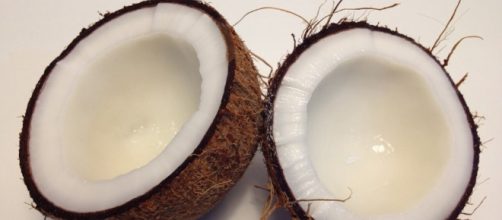Coconut Oil is one of those foods that has been super trendy lately. Like kale, quinoa, and green juices, it is popping up in grocery stores across the nation and is frequently used in snacks and other processed treats as a 'healthier' alternative to butter. Despite its popularity, coconut oil is not as healthy as you may think, according to Science Alert, who cites a study by the American Heart Association (AHA).
The science of dietary fats
Dietary fat appears in three main forms: saturated fats, unsaturated fats, and trans fats. Unsaturated fats are thought to be the healthiest form of dietary fat and include omega-3 fatty acids.
On the molecular level, unsaturated fats are composed of a hydrogen and carbon which bind together to form a chain. Elemental carbon has four electrons in its outermost layer, allowing it to bond with up to four other atoms at a time. In an unsaturated fat, the carbon has bonded twice with one of its neighboring carbon atoms in an arrangement known as a double covalent bond. Because of the double bond, the carbon is only able to bind with one hydrogen atom instead of two. This causes a kink in the carbon chain which makes unsaturated fats liquid at room temperature. They are thought to help regulate insulin levels and lower the risk of developing cardiovascular disease.
Saturated fats, on the other hand, have single bonds between the carbon atoms meaning that each carbon is bonded to two other carbon atoms and two hydrogen atoms.
This causes a straight hydrocarbon chain to form. This allows the individual fat molecules to pack extremely close together. As a result, saturated fats such as butter are solid at room temperature. Health professionals recommend that saturated fats are only consumed in moderation as they raise levels of LDL (the type of cholesterol known to contribute to cardiovascular disease) and increase a person's risk of developing type 2 diabetes.
The third type of fats are trans fats which are arguably the most unhealthy type of dietary fat. Trans fats are saturated fats which have undergone a process that makes them look like unsaturated fats and thus appear liquid at room temperature. This can be due to extreme temperatures or a scientific procedure known as partial hydrogenation.
Trans fats increase LDL levels and can increase someone's risk of getting cardiovascular disease.
Coconut oil has never been healthy
Coconut oil is solid at room temperature and can only be melted at high temperatures. Its solid state tells us that coconut oil is a saturated fat meaning that it can have fairly detrimental effects on your cardiovascular health. Despite this, there is a large misunderstanding among consumers that coconut oil is healthy. Coconut oil is over 80 percent saturated fat meaning that it increases LDL levels and can cause buildup in the arteries. This is more than the amount found in butter or lard.
The American Heart Association (AHA) conducted a poll and found that 72 percent of Americans believed that coconut oil is healthy while only 37 percent of nutritionists make the same claim.
The media portrays coconut oil as the key to weight loss, a way to boost your metabolic rate, and as the secret to fixing your digestive problems. This kind of misleading marketing leads to mass confusion and explains the difference between the consumers' understanding of coconut oil and professional opinion.


